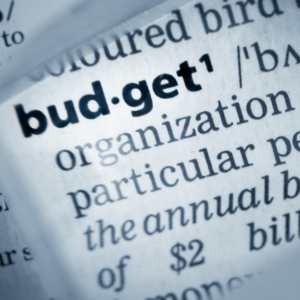This article may contain affiliate links. See our disclaimer for more information.
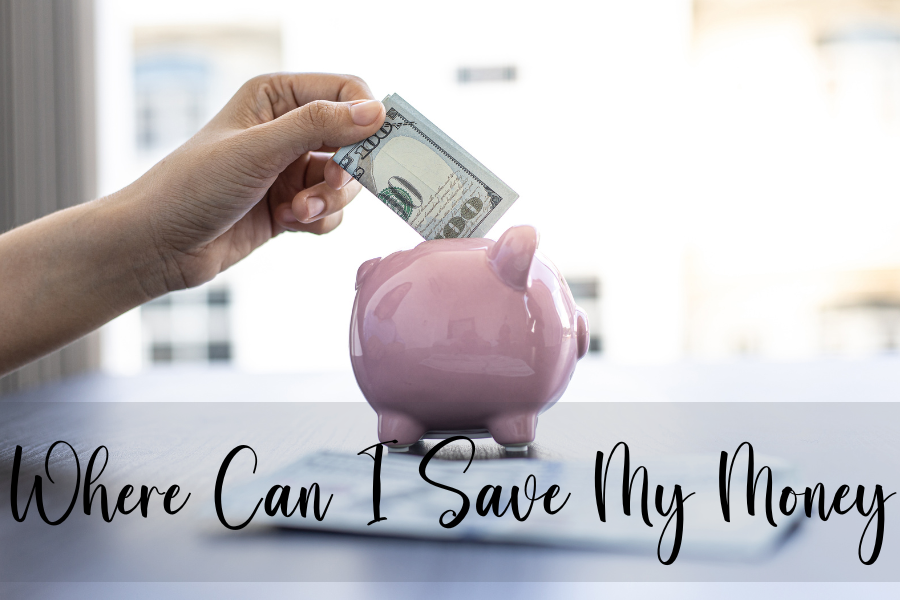
Today we are going to do a deep dive on the hot question: Where can I save my money? We’ll dig into high yield savings accounts, storing it in your mattress and so much more.
Where can I save my money is a common question and one I ask myself regularly. The first thing you need to decide is what the money is for and when you’ll need it.
These are the most important questions to consider, as some places on this list can tie up your money for years while others can be accessed that day.
Once you’ve decided on that, read on for a list of great places to save your money to help meet your financial goals.
1. Traditional Savings Account
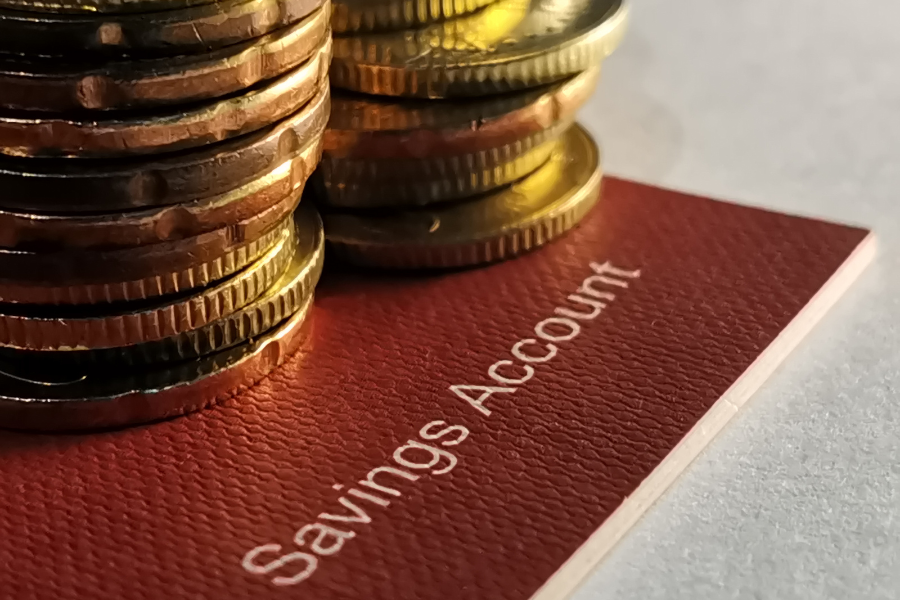
I’m betting if you have a regular checking account you likely have a traditional savings account too. Pros:
- The best part about these accounts is their accessibility. Every bank and credit union near you will have one. If you need to access your funds, you can easily swipe your debit card at an ATM or head to your local branch.
- A lot of banks offer savings account sign up bonuses if you meet certain terms and conditions. This can yield you a few hundred extra dollars just for opening and account.
- Because these come through a bank, your account will be federally insured (FDIC) up to $250,000. This means your money is backed and protected by the federal government.
Cons:
- In my opinion the biggest con with a traditional savings account is the low interest rate. Right now the average is about a .6% for savings. This is nothing compared to the rates we’ll see in the next section below.
- Another con is the transfer limit on savings accounts. Most banks, online and in person, only allow you to transfer money out 6 times a month. After that, some will lock up your money and some will impose a fee. If you don’t move money around much this could be a non factor for you, but if you move money around a lot, this can be a big inconvenience.
- Some of these accounts require a minimum balance or else you get hit with fees. For a long time I had a savings account where the minimum was $300. One day I needed that money. My options were to withdraw below the $300 or close the account.
I encourage you to shop around for a savings account. You may be tempted to get one where you already have your money, but other banks may have better rates and offers. Local banks and credit unions usually have good promotions to entice people to use them. Sometimes bigger banks run nice “join us” promos to bring in more users. It will never hurt you to shop around.
2. High-Yield Savings Account (HYSA)

High-Yield Savings accounts are very similar to traditional savings accounts, but they have higher interest rates. A majority, if not all, of these accounts are through online banks. If you are wondering where can I save my money without tying it up in case I need it, this is probably the best choice. Here are some pros and cons.
Pros:
- Right now the interest on many of these accounts is around 4-5%. Rates are consistently higher than traditional savings accounts and banks like Ally and Vio are well known for their competitive options
- Fewer fees. Because most of the banks that offer high yield savings accounts are online, they don’t have to maintain branches and physical presence. Due to this, they usually offer better rates and fewer fees.
- A lot of HYSA’s compound interest daily rather than monthly. This can have a significant impact on the amount of cash you earn over time.
- Almost all HYSAs are federally insured (FDIC) just like traditional savings accounts up to $250,000.
Cons:
- Because most institutions that offer HYSA’s are online, it can be harder to access your funds. If you lose your debit card, you’ll have to wait until you either get another one, or your funds transfer to a traditional bank to withdraw.
- There is a fee if you withdraw more than six times in a month. This can make the account more difficult to operate because it is an online account and you are limited in withdrawal options.
- Some (but not all) HYSA accounts require you to have a minimum balance in order to get the higher interest rate. You’ll still earn interest without it, but if your account falls below the required minimum, you’ll earn much less in interest.
- Rates can easily fluctuate depending on federal rates. This could be good for you, if the rates are high, but it makes it impossible to calculate what your returns will be consistently. When I opened my first HYSA the interest was at 1.5% and now it’s at 5.3%. It’s been good for me so far!
While you’ll never get the same returns as long term investing, HYSA’s are a great place to store shorter term savings, or something you will always need accessible such as an emergency fund.
3. Certificates of Deposit (CDs)
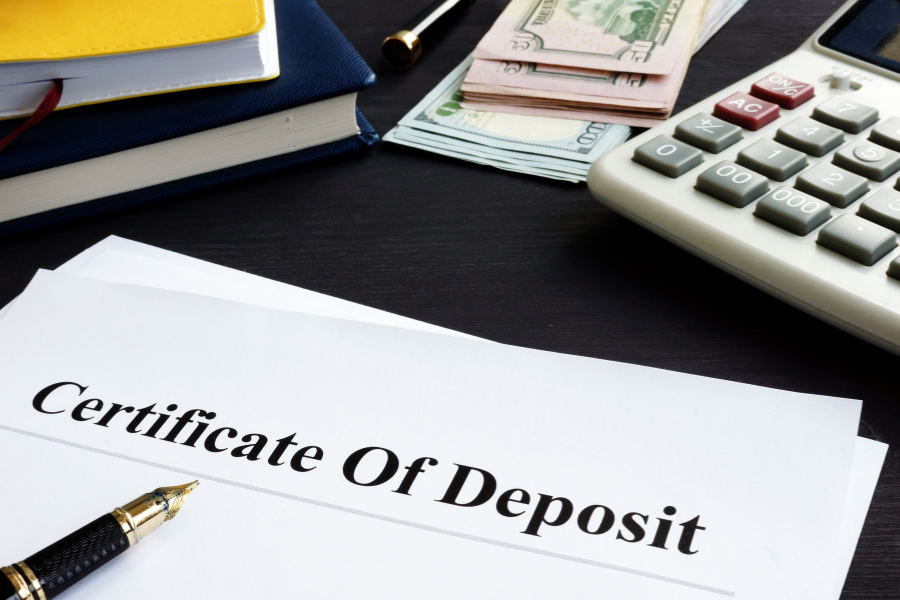
Next on our list of where can I save my money is CDs. You may have seen these advertised at your bank, but do you know what they are? A CD is an account that holds your money for a set amount of time in exchange for an agreed upon amount of interest returned. For example you may get a five year CD at 4% interest. After the five years, you will get the original amount invested plus the interest accrued paid out to you.
Pros:
- CDs usually have higher interest rates than a traditional savings account. Right now these rates are hovering between 4% and 5%, making them similar to an HYSA. The difference is, once you lock in a rate for a CD, you keep that rate for the length of your CD. It will not fluctuate like a savings account.
- Your money is guaranteed unlike other investment options. At the end of your term, you get the amount you put in, plus the interest. There is no fluctuation or potential loss of investment unless you withdraw early.
- They are an extremely safe place to put your money. CDs are FDIC insured, and they are a safe, secure way to grow your investments.
Cons:
- Your money is stuck for the length of the CD. Unless you want to incur a penalty for early withdrawal, you won’t have access to your money until the CD is up..
- If rates are increasing, you may be locked into a lower one for the length of the CD. Rates fluctuate regularly. Let’s say you lock in a rate of 2%. If rates drop to 1%, you’re doing good. But if they jump to 6%, you’re stuck at that 2%.
- The rates are generally much lower than the stock market. While putting your money in the stock market is much riskier, your rate of return is likely to outweigh that of a CD.
In my opinion CDs are a great short to medium term solution. If you’re wondering where can I save my money in a place where I won’t lose it, can make me a little extra cash, but can be accessible in a certain time frame, the a CD is for you.
Say you have the money saved for a car, but You’re not buying one until next year. Put that money in a CD. Or, you can use a CD to offset your stock investments, and have a nice, guaranteed investment in case stocks do go south.
4. Money Market
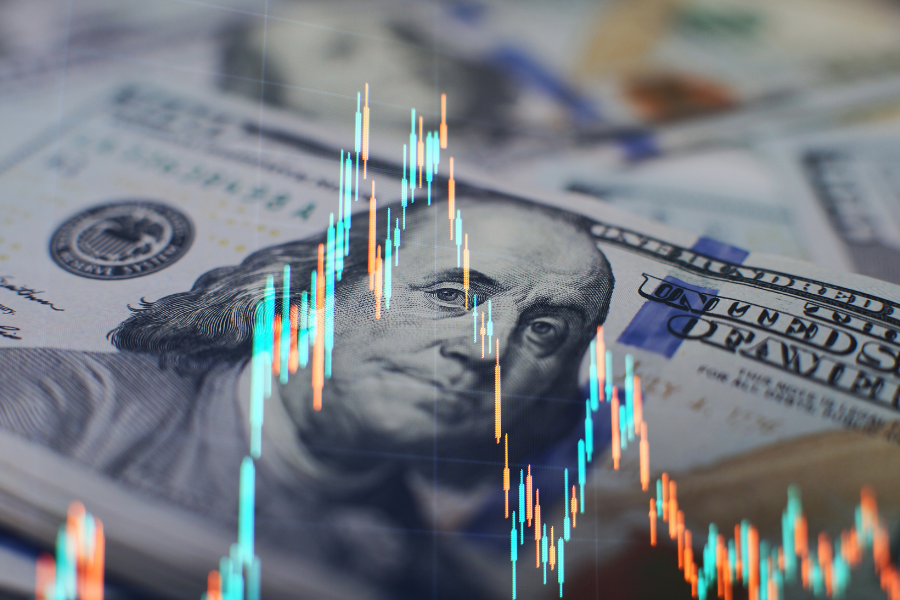
A money market account combines together aspects of a savings account and a checking account. This type of account pays interest based on the current rates.
Pros:
- Money market accounts generally have savings rates similar to HYSAs and CDs. They are another good option to keep short and mid term savings in.
- You have easy access to your cash. While not as easy as a checking account, your money can be easily accessed from a money market account, enabling you to save easily, while still finding the money available if needed.
- Along with the other types of savings accounts, money market accounts are FDIC insured, so your money is well protected.
Cons:
- Depending on the bank, you may find better rates elsewhere. CDs tend to be a bit higher, as the bank will reward you for keeping your money locked with them longer.
- Pesky minimum balances come with most money market accounts. Some banks and credit unions require a significant amount of money to be in the account to qualify for the higher interest rates.
- There is a possibility for monthly fees. Some banks require a minimum balance to avoid monthly fees, so make sure you read all of the terms and conditions.
If you are considering a money market account, I would recommend they be used for something like an emergency fund or short term savings such as a car or wedding. Be sure to check the bank’s regulations surrounding the account so you can make the best of your hard earned savings.
5. Investment Accounts

There are many different investment accounts types out there. These are some of the best accounts for long term savings. If you’re wondering where can I save my money and get good long term returns, this is one of your best bets. Be sure to do careful research on investing as there are many different accounts types, and it can get very complicated very quickly.
Pros:
- Over time, the stock market has provided significant returns on savings, generally 8-10%. If you’re willing to leave your money in for the long haul and leave it alone, your savings can grow significantly.
- In today’s day and age, with robo advisors and online banking, it is easy to buy and sell your investments. It can be fun to play with stock and bonds options and invest in causes you believe in (just be sure they’re likely to be profitable or you may find yourself out some money).
- There is a potential for dividends. These are payments made to stock owners, usually quarterly, based on what percentage of a company you own and how they perform. Dividend payouts can be reinvested to help further boost your savings, or paid out to you for a little extra cash.
Cons:
- The volatility of the market is what scares most people away from investing. Throughout history there have been several major dips in the market, resulting in the loss of a lot of money. However, if you can keep your money invested and weather the storm, you will come back even better after the market starts to go back up.
- A big con, if unplanned for, is that your gains from investing are taxed. These taxes can cut into your return, making your savings valued a little lower than they appear. Be prepared to pay taxes when you start taking withdrawals down the line.
- Let’s be honest, there is a big emotional factor to investing. It can be disheartening to see the value of your money plummet in a downturn. It can be emotionally devastating to watch your hard earned savings deteriorate with a bad investment. As I said, be careful, do your research, and be prepared for the ups and downs of investing.
If you choose to invest, make sure you do a lot of research. Investing is risky and confusing, but the long term results can make it worth it. Check out stocks, bonds and EFTs to get started on your investing journey.
6. 401(k) and Retirement Accounts
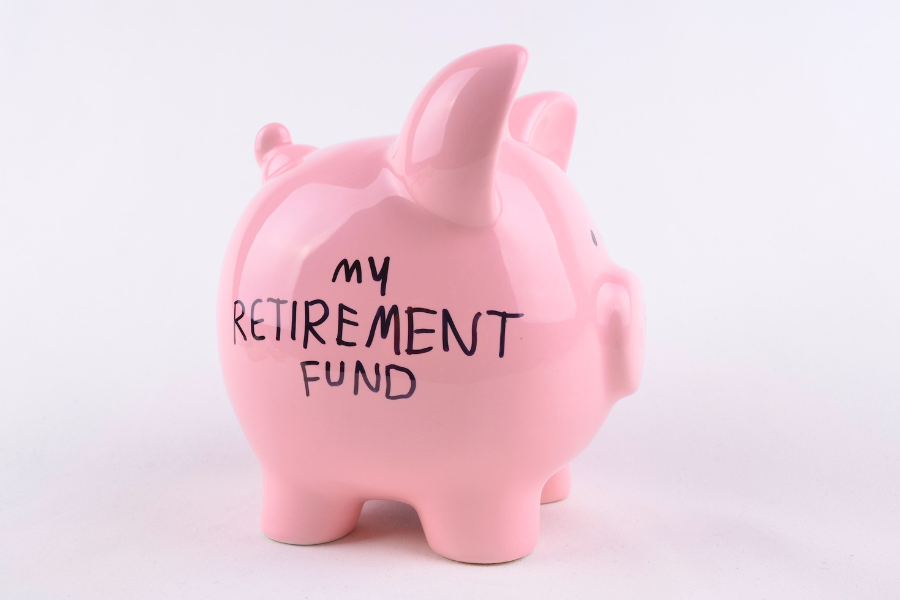
I strongly encourage you to save money for retirement, and I strongly urge you to start saving now. The sooner you save, the sooner you can grow your money. Retirement counts are a great way to save money for the long-term.
Pros:
- Almost all retirement accounts come with some sort of tax benefit, whether it’s now, or at the time of retirement. These benefits can save you significant money if handled the right way.
- Employer sponsored plans like the 401(k) and 457(b) sometimes come with employer contributions. They will match a certain amount of the investment you make. This is FREE money. How often can you say you get a chance at free money? One of my employers matches 50% of the first 6% I put into my account. That’s extra money each check that they are contributing to my future for me.
- Many retirement account types offer some sort of loan option in the event of an emergency or financial crisis. While the money generally cannot be touched without penalty until you reach retirement age, it is nice to know there is money available in case of an extreme financial emergency.
Cons:
- Contribution limits exist for nearly all retirement programs. This means, if you are trying to put away a significant amount of money each year, you will likely have to look elsewhere. IRA’s max out at $6500 for contributions and a 401(k) is at $20,500 per year.
- Especially if you are using an employee sponsored retirement fund, you may be limited in where you can invest your money. Some companies only let you invest in certain stocks or funds, and this can limit your options for investing.
- Almost all retirement accounts also have fees to withdraw your money before retirement age (not including the possibility of a loan). If you want access to your money before 59 ½, be prepared to pay a 10% penalty.
Retirement accounts are the ideal place to save for your older self. It’s important to save for the long-term so you don’t find yourself having to work well into your seventies because you did not plan today. With tax benefits, investment options, and the ability to start saving today, putting money into a retirement account should be one of your first where can I save my money options.
7. Real Estate

Real estate investing is another great place to save your money, and earn returns. There are many different ways to save with real estate, including putting your money into properties, or buying stock in REIT’s (real estate investment trusts).
Pros:
- One of the best pros of real estate investing is the potential for a steady stream of cash flow income. Whether you are investing in a property yourself, or lending so someone else can do so, you can almost guarantee yourself money, as long as the property is a good deal.
- If you own the real estate you are saving your money in, your property can benefit your taxes as a depreciation shield. Even if the property increases in value, a portion of it can be written as a depreciation on your taxes. Make sure you consult a tax advisor before making any decisions about rental properties.
- If you can find a property below market value, you have just increased the value of your savings exponentially. And let me tell you, this is very common in the real estate community. For example, your neighbor has passed and the family no longer wants to care for it. The house is appraised at $100,000 but the family just wants it off their hands, so they sell it to you for $80,000. You just put your savings into a valuable property and made $20,000
Cons:
- Putting your money into real estate, and ensuring you don’t lose money, can be a long, grinding task. There is a lot to learn and a lot to know, and it is not easy to learn quickly.
- The more savings you put into real estate, the more responsibilities you will likely have. Properties need maintenance, upkeep and renters. This can be a lot of work. Even if you are loaning to another investor, you need to make sure things are happening according to plan so you can ensure your savings are safe.
- Real estate is subject to high taxes, depending on your income. Every dollar made in real estate is taxed, and some methods, such as flipping houses, result in a large tax bill.
Real estate can be a game changer if you choose to put your savings toward this type of investment. There is a potential to make a significant amount of extra income with your saved dollars, but like anything else, it can be very risky. Make sure you do your research, and talk with professionals before throwing your money into something you don’t understand.
8. Peer to Peer Lending
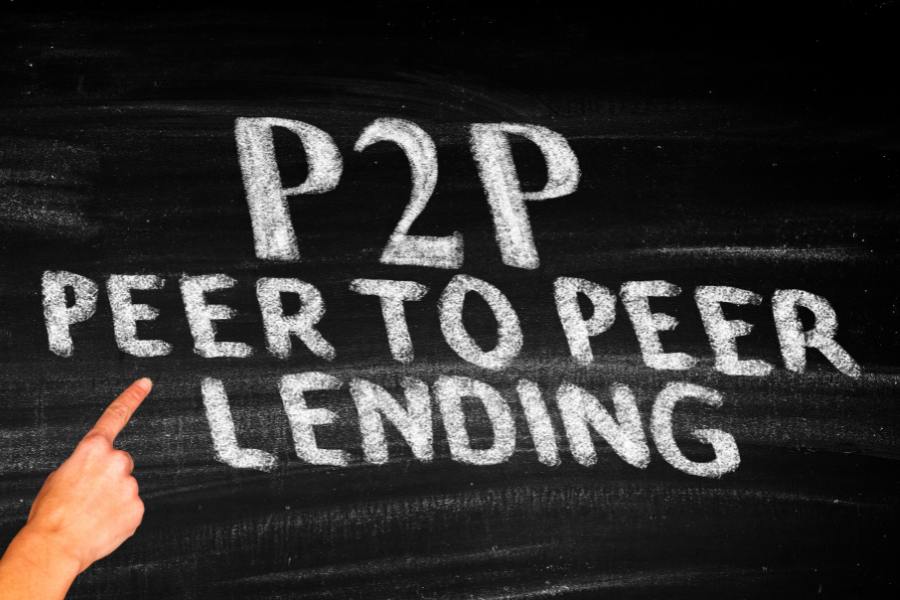
Looking for another place to save your money, and earn some extra income from it? Try to invest in peer to peer lending. This is an alternative investment type where you act as the bank. Through lending sites such as Prosper and LendingClub, you can choose strangers to lend your money to and set your own interest rates.
Pros:
- There is a potential to earn higher interest rates than most savings accounts through these sites. You can set your rates based off similar interest rates, allowing you to be competitive and keep up with inflation.
- With a IFISA (Innovative Finance Individual Savings Account) you can potentially invest a certain amount to peer to peer lending tax free. If you stay within the limits, your income from P2P lending will be tax free.
- Some sites have contingencies in place to protect your money in the event of the borrower defaulting. This can make it a much safer place to keep your money, and eliminate the risk that comes with unpaid loans.
Cons:
- There is always a potential to lose your money if the borrower decides to stop paying. It can be costly to take this to court, and there is a good chance you may never see your money if this happens.
- Your money is generally stuck for the length of the loan. You lent the money to someone, so you can’t just pull it back unless you can find another lender to take over.
- Returns may be lower than expected if the borrower pays off the loan early. Even with a higher interest, you could miss out on years of income if they pay off the loan in one year instead of five.
Peer to peer lending is a unique and fun way to use your savings. You can keep lending out the same funds, once one borrower pays it back, and collect the income from the loans. I think it’s certainly worth a look if you are looking for somewhere different to store your savings.
Conclusion

I spent a lot of time wondering where can I save my money? And the answer I have discovered is, there are many, many different options for where to keep your hard earned extra savings.
When deciding where to save your own money, I encourage you to look at your financial goals, and assess how your feel about risk. If you are uncertain, you can start with investing a small amount, or keep your money in a safer place like a HYSA.
You also need to determine when you will need the money. Don’t save money you will need next year in a retirement account. The fees and penalties to withdraw the funds will negate any positives the investment could have had.
Evaluate your personal situation, and get saving!




